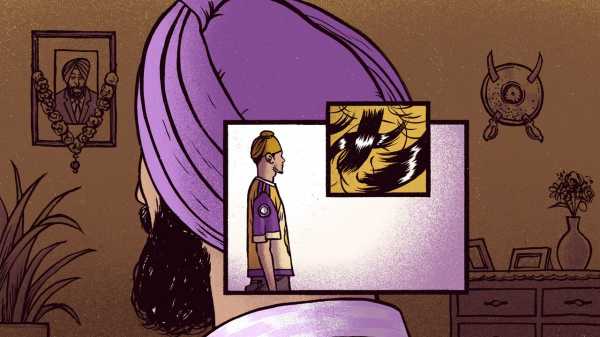
Save this storySave this storySave this storySave this storyYou’re reading Critic’s Notebook, our weekend column looking at the most interesting moments in the cultural Zeitgeist.
At some point during our new Gilded Age, as the United States and the world have become more unequal, did Prince Charming die? His cohort of have-yachts have made themselves newly and counterproductively available to our imaginations, posting on social media, sometimes using their own platforms, their glamor dissipating with every bid for laughs or likes. A woman in want of blue-chip fantasy fodder can take her pick from a sickly crop of tech tycoons—Elon Musk, for example, might solicit her to bear one of his “legion” of children via I.V.F. Or perhaps she’d prefer to sign up for membership in the train wreck of the British Royal Family?
A spate of television and books scrutinizing the one per cent attests to the difficulty of romanticizing the pursuit of wealth, especially when it is coupled with the pursuit of love. In the first season of “The White Lotus,” a journalist who marries a Master of the Universe type is promptly labelled a trophy wife. None of the Roys’ intimate relationships in “Succession” beat the charges of opportunism. (Indeed, the purest and most passionate liaison on that show develops between Tom and Greg.) Morally compromised marriages of convenience are even a plot point in the Star Wars spinoff “Andor”: in order to secure funds for her revolutionary organizing, Senator Mon Mothma must pair off her daughter with the son of a scheming magnate.
“Materialists,” a new film by Celine Song, is the latest instance of this trend. The film unfolds in the world of high-end dating services and weddings that cost hundreds of thousands of dollars. Lucy (Dakota Johnson) is a matchmaker for a boutique company called Adore, where she fields demands from absurdly choosy and unrealistic clients, who are not seeking a connection with another person so much as they are a designer accessory. Their relationship specifications are ludicrously precise: a man in his forties wants a mature twenty-seven-year-old; another man’s definition of “fit” is “nothing over twenty B.M.I.” and a woman’s least negotiable criterion is a high-six-figure salary at minimum.
Song’s demystification of what passes for love in a typical rom-com is bracing. The genre often drapes its characters’ Wharton-esque sharp elbows in gauzy layers of hetero-optimism. But dating, in “Materialists,” is a gauntlet of “risk and pain,” and weddings are even worse. (One of the film’s quiet delights is its unsentimental portrayal of the indignities of this ritual: the Stepford bridesmaids, the dreadful live bands, the tulle, the sweat.) When one of Lucy’s clients admits, with mascara streaming down her cheeks, that the only reason she accepted her soon-to-be husband’s proposal was to make her sister jealous, Lucy nods understandingly—“he makes you feel valuable,” she affirms. Three-quarters of the way through the movie, she yells, cathartically, “we are a SCAM!”
The movie’s world of endlessly customizable options provokes a desperate perfectionism in Lucy’s clients. Lucy, however, prides herself on her lack of illusions about love—until “Materialists” pushes Prince Charming into her path, at a ball (a wedding that Lucy facilitated). His name is Harry (Pedro Pascal), and he must be a mythical creature, straight out of a storybook: he’s practically made of paper. Lucy’s colleagues refer to men like him—tall, handsome, in finance, intelligent, urbane—as unicorns. When Lucy protests to Harry that he’s out of her league, he suavely enumerates her material and her intangible assets; then he twirls her around his twelve-million-dollar Tribeca penthouse.
At the same event at which Lucy meets Harry, she also reconnects with an old boyfriend, John (Chris Evans), an appealingly scruffy actor and cater waiter whom Lucy dumped on account of his financial struggles. Where Harry and Lucy engage in sparkling bouts of banter, John and Lucy communicate preverbally, through ardent stares. Song appears to be recreating a dynamic from her début film, “Past Lives,” in which a woman was caught between her husband (the comfortable choice) and her childhood sweetheart (the heart-meltingly romantic but deeply impractical choice). In that movie, the heroine stayed with her spouse, but “Materialists” dreamily rewrites the script: in a development that feels, alas, rushed and emotionally unconvincing, Lucy decides to be with John. Harry incarnates a stressful perfection, the kind that always threatens to crumble or to reveal its counterfeit nature; John’s pitch to Lucy is that he loves her, always has loved her, and always will love her. He can’t help it. His love is like a Netflix feed: it’s frictionless, it’s dependable, and it fits her exactly. In the end, the resolution of the love triangle doesn’t evoke a triumph of wild passion over hard-nosed calculation. Rather, Lucy’s choice of John feels sneakily practical in its way—a reprieve from the hustle, the quest for materially remunerative love that only ever feels like work. Although a cosmically fated romance may well be transcendent, what it really has going for it turns out to be no-fuss dependability.
Song isn’t alone in her desire to educate a would-be Cinderella out of her bourgeois striving. In Sean Baker’s “Anora,” which won five Oscars at the 2025 Academy Awards, a stripper named Ani falls for Ivan, a Russian failson with billionaire parents. After a whirlwind romance, the couple elopes, holing up in sumptuous style at Ivan’s familial manse in Brooklyn. When Ani’s best friend compares her to Cinderella, she laughs giddily, flush with the spoils of a consumerist American Dream. Soon afterward, Ivan’s parents force him to annul the marriage, and it’s as if Ani’s sable fur and Hervé Léger bandage gown have been turned to rags: He betrays his bride, who is punished with a series of humiliations and abuses before she accepts a meagre payout in return for disappearing from his life. The movie ends with Ani and one of the enforcers, the gentlemanly Igor (Yura Borisov), sharing an embrace, although their future together seems achingly tenuous.
Both “Materialists” and “Anora” seek to uncouple love from materialism, but they go about it differently. In Song’s film, Lucy achieves the romantic happy ending without the money—once she discards her fixation on personal finance, she’s able to appreciate her cater waiter’s heart of gold. Ani, though, must learn a harder lesson. She hasn’t transgressed in wanting nice things or in negotiating an economic arrangement with Ivan, but in falling for the fairy tale. The metaphor of stripping is never far from our minds: Ani is exposed; she has let down her guard. When Ivan takes her shopping, she spins unself-consciously in front of a full-length mirror, eager to see herself as valuable. She’s foolish and starry-eyed enough to quit her job, and, later, to believe that a marriage contract could protect her against the whims of the super-rich. If Lucy is censured for her coolly transactional approach to love, Ani is chastened for her innocence—for not being cynical enough.
It’s a sign of our unsettled times that neither of these films can replace Cinderella with a compelling alternative. “Materialist” ’s treatment of its male leads renders Lucy’s decision internally incoherent. Because the movie doesn’t convincingly disavow materialism (at least as embodied by Pascal), the main character’s choice to do so feels didactic and contrived. The suggestion is that Harry, who himself represents the apotheosis of box-ticking, operates in a commercial mode even when he’s crooning about Lucy’s “intangible” selling points. In order to be a true disciple of love, Lucy needs to reject his superficial charms for John’s steady presence. But the film doesn’t effectively convey the mystical quality of Lucy’s bond to John, nor does it get across what, exactly, is so lightweight and inadequate about her relationship with Harry.
“Anora,” in contrast, decisively punctures the Disney fantasy, but in a way that feels fatalistic and cruel. Everywhere in the movie, money’s pull is stronger than that of love, friendship, private ethics, or social justice. And although this could be intended as Marxist critique, it feels more like artistic convenience—the film derives much of its emotional power from its so-called capitalist realism, its claim to see the world through an utterly disenchanted lens. Instead of wishing away material reality, “Anora” seems designed to force its heroine to accept a cartoonishly blunt and brutal version of it. The movie can abide mobster violence and the exploitation and acquisitiveness of its characters; what it can’t abide is Ani’s idealism. Tellingly, Baker predicates her moment of personal growth—when she finally connects to Igor—on her resigning herself to her socioeconomic place.
And, although Song eschews Baker’s pessimism—she wrote a rom-com, after all—she seals her movie with a similar gesture, conditioning Lucy’s storybook ending on the character setting aside her hopes for social mobility and taking up with John. A princess choosing a cash-strapped but virtuous suitor over a prince needn’t feel didactic. But “Materialists” and “Anora” are very much in the business of desire didacticism. You can tell because the two films struggle to imagine how desire might move when it is free. Both works are so consumed in the symbolic attributes of their male leads that they fail to capitalize on their gravitational pull: no character played by Evans or Borisov should require the affirmative action of class solidarity to appear as a convincing romantic object. Nor should any red-blooded heroine be expected to drop as alluring a presence as Pascal. Love, in these movies, emerges as a virtuous vegetable. But the best romances, whether comedy or drama, make a whole meal of it. ♦
Sourse: newyorker.com







